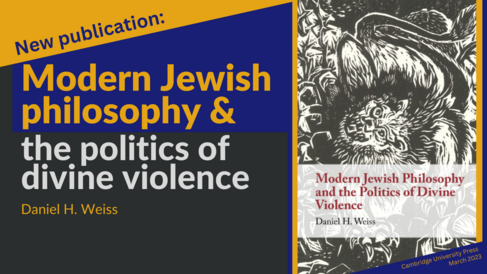
Is commitment to God compatible with modern citizenship? Daniel Weiss provides new readings of four modern Jewish philosophers – Moses Mendelssohn, Hermann Cohen, Franz Rosenzweig, and Walter Benjamin – in light of classical rabbinic accounts of God's sovereignty, divine and human violence, and the embodied human being as the image of God.
In Modern Jewish philosophy and the politics of Divine Violence (Cambridge University Press, 2023), Weiss demonstrates how classical rabbinic literature is relevant to contemporary political and philosophical debates. The book brings to light striking political aspects of the writings of the modern Jewish philosophers, who have often been understood as non-political. In addition, Weiss shows how the four modern thinkers are more radical and more shaped by Jewish tradition than has previously been thought. Taken as a whole, Weiss' book argues for a fundamental rethinking of the relationship between Judaism and politics, the history of Jewish thought, and the ethical and political dynamics of the broader Western philosophical tradition.
Praise for this book (via the publishers, Cambridge University Press):
‘Weiss offers new and compelling readings of a number of seminal modern Jewish philosophers, while also setting forth a provocatively fruitful vision of modern Jewish philosophy as not merely the product of modern Europe but rather as the rightful inheritor of classical Jewish thought. Anyone interested in Judaism, modern philosophy and indeed the relationship between religion and politics will have much to gain from this timely and important book.’—Leora Batnitzky, Princeton University
‘Weiss shows the urgent relevance of both the classical rabbinic tradition and modern Jewish philosophy by reading each in light of the other – with unexpected results that challenge our understanding of human and of divine violence. What begins as a close study of surprising continuities within Judaism becomes a forceful critique of the Western philosophical tradition and its insufficient regard for the living individual.’—Holger Zellentin, University of Tübingen
‘Daniel Weiss has written a highly original consideration of the relationships between modern German-Jewish thought, classical rabbinic thought, and some of the core questions of political violence. Every thinker considered appears in a new light: Mendelssohn and Cohen are no longer so staid and bourgeois, Rosenzweig no longer so otherworldly, Benjamin no longer so disconnected from rabbinics. Instead, all four appear as rabbinic-anarchic critics of sovereign violence, articulators of an alternative mode of reason that challenges philosophy and political theology alike.’—Samuel Hayim Brody, author of Martin Buber’s Theopolitics
‘With refreshingly careful treatment of Moses Mendelssohn, Hermann Cohen, Franz Rosenzweig, and Walter Benjamin, Weiss shows how their Jewish theopolitical thought is informed by rabbinic Judaism. Along the way he demonstrates that they have been poorly understood by their Christian and other mainstream critics, who in turn have subjected their thought to the terms of dominant discourses and imaginaries. Weiss thus walks the reader through a rich and inspiring landscape of these Jewish critical engagements with the structures of the modern state and its corresponding violence. Christian political theologians and others will find in Modern Jewish Philosophy and the Politics of Divine Violence a badly needed window for understanding early Christian theopolitics, which, considered without such Jewish sensibilities, have been systematically domesticated to authorize and fuel the violence of the modern state. I expect that the book will be for others what it has been for me, a gift for the imagination of a messianic politics.’—Tommy Givens, Fuller Theological Seminary
